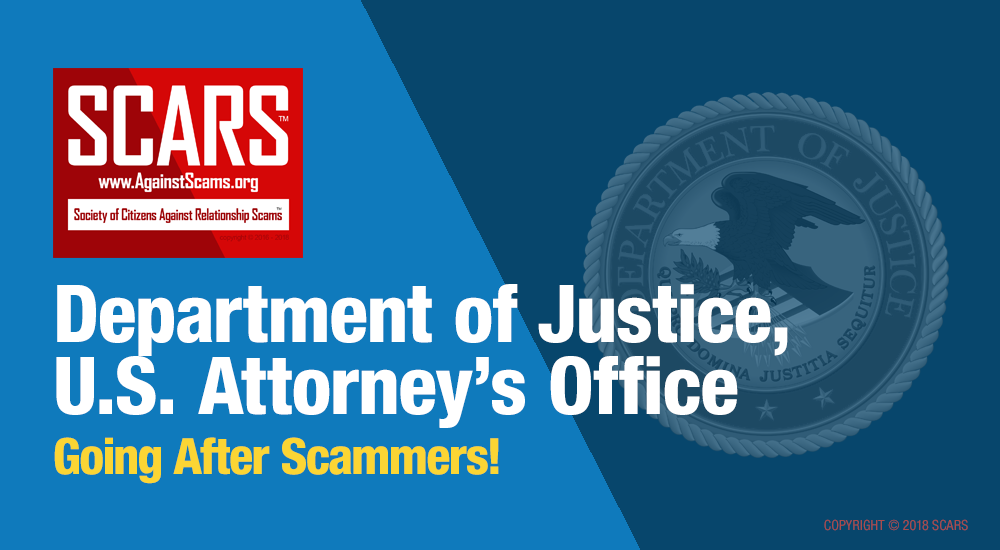SCARS™ Scam & Scamming News: Massive International Fraud and Money Laundering Conspiracy Detailed in Federal Grand Jury Indictment that Charges 80 Defendants
Department of Justice, U.S. Attorney’s Office
Central District of California
OFICIAL DEPARTMENT OF JUSTICE RELEASE
Thursday, August 22, 2019
Criminal Indictment
LOS ANGELES – A 252-count federal grand jury indictment » unsealed today charges 80 defendants, most of whom are Nigerian nationals, with participating in a massive conspiracy to steal millions of dollars through a variety of fraud schemes and launder the funds through a Los Angeles-based money laundering network.
The indictment was unsealed after law enforcement authorities this morning arrested 14 defendants across the United States, with 11 of those arrests taking place in the Los Angeles region. Two defendants were already in federal custody on other charges, and one was arrested earlier this week. The remaining defendants are believed to be abroad, with most them located in Nigeria.
The indictment alleges that the 80 defendants and others used various online fraud schemes – including business email compromise (BEC) frauds, romance scams, and schemes targeting the elderly – to defraud victims out of millions of dollars. According to a criminal complaint also unsealed today, co-conspirators based in Nigeria, the United States and other countries contacted the lead defendants in the indictment – Valentine Iro, 31, of Carson, and Chukwudi Christogunus Igbokwe, 38, of Gardena, both Nigerian citizens – for bank and money-service accounts that could receive funds fraudulently obtained from victims. Once members of the conspiracy convinced victims to send money under false pretenses, Iro and Igbokwe coordinated the receipt of funds and oversaw an extensive money-laundering network, according to the 145-page indictment.
The indictment and criminal complaint allege that Iro and Igbokwe, who were among those arrested this morning, were involved in schemes resulting in the fraudulent transfer of at least $6 million in fraudulently-obtained funds – and the overall conspiracy was responsible for the attempted theft of at least an additional $40 million.
The fraudsters targeted victims in the United States and across the globe, including individuals, small and large businesses, and law firms. Some of the victims of the conspiracy lost hundreds of thousands of dollars to fraud schemes, and many were elderly.
“This case is part of our ongoing efforts to protect Americans from fraudulent online schemes and to bring to justice those who prey upon American citizens and businesses,” said United States Attorney Nick Hanna. “Today, we have taken a major step to disrupt criminal networks that use BEC schemes, romance scams and other frauds to fleece victims. This indictment sends a message that we will identify perpetrators – no matter where they reside – and we will cut off the flow of ill-gotten gains.”
“Today’s announcement highlights the extensive efforts that organized criminal groups will engage in to perpetrate BEC schemes that target American citizens and their hard-earned assets,” said Assistant Director in Charge Paul Delacourt of the FBI’s Los Angeles Field Office. “Billions of dollars are lost annually, and we urge citizens to be aware of these sophisticated financial schemes to protect themselves or their businesses from becoming unsuspecting victims. The FBI is committed to working with our partner agencies worldwide to continue to identify these cyber criminals and to dismantle their networks.”
Iro and Igbokwe essentially were brokers of fraudulent bank accounts. According to the indictment, Iro and Igbokwe collected bank accounts, fielded requests for bank account information, provided that information to co-conspirators around the world, and laundered the money obtained from victims – all of this in exchange for a cut of the money stolen from victims of the various fraud schemes.
If a bank account with a specific business name was required to trick a business-victim into making a payment, Iro and Igbokwe often coordinated with “money mules” to open accounts that could receive funds obtained, according to court documents. In addition to making the fake business name mirror the name of a legitimate company, members of the conspiracy routinely filed fictitious business name statements with the Los Angeles County Registrar/Recorder’s Office that were presented to banks when the fraudulent accounts were opened.
Once a victim deposited funds into a bank account or a money services account, Iro and Igbokwe allegedly coordinated with others to further launder the funds. Members of the conspiracy sometimes wired funds to other bank accounts under their control; in other cases, they simply withdrew funds as cash or negotiable instruments such as cashier’s checks.
When stolen funds were withdrawn as cash, the defendants frequently used illicit money exchangers (money mules ») to move funds overseas, generally avoiding transferring the funds directly through banking institutions, the indictment alleges. To do this, Iro and Igbokwe coordinated the transfer of a victim’s funds from a fraudulent bank account they controlled to U.S. bank accounts belonging to illicit money exchangers. Those money exchangers, in turn, used a Nigerian banking application to transfer other funds in naira (₦), the currency of Nigeria, from Nigerian bank accounts they controlled to the Nigerian bank accounts specified by Iro and Igbokwe. This method was used to transfer millions of dollars to Nigerian co-conspirators without directly transferring funds overseas. The indictment alleges that Jerry Ikogho, 50, of Carson (who was taken into custody on Sunday), and Adegoke Moses Ogungbe, 34, of Fontana, were among those who served as illicit money exchangers for the conspiracy.
Each of the 80 defendants named in the indictment is charged with conspiracy to commit fraud, conspiracy to launder money, and aggravated identity theft. A number of the defendants also face substantive fraud and money laundering charges.
Additionally, Iro, Igbokwe, Ikogho, Ogungbe and three other defendants –Izuchukwu Kingsley Umejesi, 30, of Los Angeles, Tityaye Marina Mansbangura, 33, of Palmdale, and Obi Madekwe, 31, of Nigeria – are charged with operating illegal money transmitting businesses. Ogungbe and Mansbangura were also among those arrested this morning, and Umejesi is a fugitive currently being sought by authorities.
Iro, Igbokwe and Chuks Eroha, 39, face additional charges for attempting to destroy their phones when the FBI executed a search warrant in July 2017. Iro also is charged with lying to the FBI in an interview conducted during the search. The complaint alleges that, when the FBI arrived to conduct the court-authorized search at Iro’s apartment in Carson, Iro broke his phone in half, while Igbokwe and Eroha threw phones from a bedroom window of the apartment. While Iro claimed he previously had broken the phone during an argument with his wife, the complaint details how the FBI was able to determine that the phone was operational until seconds after the FBI knocked on Iro’s apartment door to execute the search warrant. Eroha is believed to have fled to Nigeria shortly after the FBI executed the warrant.
The charges contained in the criminal complaint and indictment are merely accusations, and the defendants are presumed innocent unless and until proven guilty in court.
This investigation is being led by the Federal Bureau of Investigation.
The Los Angeles County District Attorney’s Office, the Los Angeles County Sheriff’s Department, and the United States Department of State provided substantial assistance during the investigation.
Several agencies provided support during today’s takedown or during the investigation, including the United States Postal Inspection Service, U.S. Immigration and Customs Enforcement’s Homeland Security Investigations, U.S. Citizenship and Immigration Services, U.S. Customs and Border Protection, the Ventura County District Attorney’s Office and the California Franchise Tax Board.
Many of the FBI’s Legal Attachés provided assistance throughout this investigation, as did the Criminal Division’s Office of International Affairs, and foreign authorities around the world. In particular, the FBI and U.S. Attorney’s Office thank the National Crime Agency in the United Kingdom and the Public Prosecutor’s Office of Osnabrück, Germany for their contributions.
This case is being prosecuted by Assistant United States Attorneys Anil J. Antony and Joseph B. Woodring of the Cyber and Intellectual Property Crimes Section.
The FBI in 2017 issued a report on the rise of BEC schemes, and published a recap of 2018’s Operation WireWire » which was an international effort to disrupt international BEC scams. An FBI public service announcement that warns of the dangers of BEC schemes encourages businesses to “trust but verify.”
PLEASE SHARE OUR ARTICLES WITH YOUR CONTACTS
HELP OTHERS STAY SAFE ONLINE
SCARS™ Team
A SCARS Division
Miami Florida U.S.A.
TAGS: Scam News, News About Scams, News About Scammers, Global Scamming News, FBI Cyber and Intellectual Property Crimes Section, Scam & Scamming News, Massive International Fraud and Money Laundering Conspiracy, Federal Grand Jury Indictment, 80 Defendants
The Latest SCARS|RSN Posts
FIND MORE SCAM NEWS
«SCAMCRIME.COM»
CHAT WITH SCARS™
«CLICK HERE»
END
MORE INFORMATION
– – –
Tell us about your experiences with Romance Scammers in our
« Scams Discussion Forum on Facebook »
– – –
FAQ: How Do You Properly Report Scammers?
It is essential that law enforcement knows about scams & scammers, even though there is nothing (in most cases) that they can do.
Always report scams involving money lost or where you received money to:
- Local Police – ask them to take an “informational” police report – say you need it for your insurance
- Your National Police or FBI « www.IC3.gov »
- The SCARS|CDN™ Cybercriminal Data Network – Worldwide Reporting Network « HERE » or on « www.Anyscam.com »
This helps your government understand the problem, and allows law enforcement to add scammers on watch lists worldwide.
– – –
Visit our NEW Main SCARS Facebook page for much more information about scams and online crime: « www.facebook.com/SCARS.News.And.Information »
To learn more about SCARS visit « www.AgainstScams.org »
Please be sure to report all scammers « HERE » or on « www.Anyscam.com »
Legal Notices:
All original content is Copyright © 1991 – 2020 SCARS All Rights Reserved Worldwide & Webwide. Third-party copyrights acknowledge.
SCARS, RSN, Romance Scams Now, SCARS|WORLDWIDE, SCARS|GLOBAL, SCARS, Society of Citizens Against Relationship Scams, Society of Citizens Against Romance Scams, SCARS|ANYSCAM, Project Anyscam, Anyscam, SCARS|GOFCH, GOFCH, SCARS|CHINA, SCARS|CDN, SCARS|UK, SCARS Cybercriminal Data Network, Cobalt Alert, Scam Victims Support Group, are all trademarks of Society of Citizens Against Relationship Scams Incorporated.
Contact the law firm for the Society of Citizens Against Relationship Scams Incorporated by email at legal@AgainstScams.org












Please Leave A Comment - Tell Us What You Think About This!